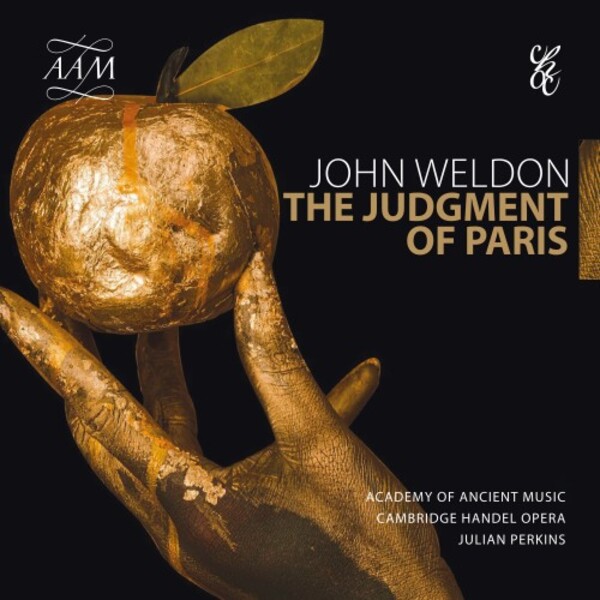WELDON The Judgment of Paris (Perkins)
View record and artist detailsRecord and Artist Details
Genre:
Opera
Label: AAM
Magazine Review Date: 04/2025
Media Format: CD or Download
Media Runtime: 75
Mastering:
DDD
Catalogue Number: AAM046

Tracks:
| Composition | Artist Credit |
|---|---|
| (The) Judgment of Paris |
John Weldon, Composer
Academy of Ancient Music Aksel Rykkvin, Attendant, Baritone Anna Cavaliero, Attendant, Soprano Anna Dennis, Venus, Soprano Helen Charlston, Juno, Mezzo soprano Jonathan Brown, Paris, Bass Julian Perkins, Harpsichord Kitty Whately, Pallas, Mezzo soprano Thomas Walker, Mercury, Tenor |
Author: Richard Lawrence
‘In March 1700 the bookseller and publisher Jacob Tonson announced in The London Gazette that “Several Persons of Quality” had put up 200 guineas to be distributed in four prizes “for the Encouragement of Musick”.’ So begins the essay by Peter Holman, one of several fascinating contributions to this splendidly produced album. It turned out that the task was to set to music William Congreve’s masque The Judgment of Paris. The four finalists were John Eccles, Gottfried Finger, Daniel Purcell (younger brother of Henry) and John Weldon. Their submissions were performed one by one at the Dorset Garden Theatre between March and May 1701; then all four were played again on June 3. The winner was Weldon, organist of New College, Oxford, and thought nowadays to be the composer of The Tempest, the semi-opera attributed to Henry Purcell.
Julian Perkins and the Academy of Ancient Music have already given us Eccles’s setting of another Congreve text, Semele: their recording was warmly welcomed by Richard Wigmore (4/21). And here is the same team in a brilliantly successful performance of the winning entry to the competition by his rival, John Weldon. The story is the one summarised with brevity and wit in ‘Au mont Ida’ from Offenbach’s La belle Hélène. Here, the god Mercury commands the Shepherd (in reality Paris, son of King Priam of Troy) to take the golden apple and ‘Yield it to the brightest Eyes’ of the three goddesses who are about to descend. After the preliminaries, Mercury returns to Olympus, and each goddess sets out her stall in turn. Venus wins the prize by bribing Paris with the love of Helen of Troy, the most beautiful woman in the world; what ensues, of course, is the Trojan War.
Although it is described as a masque, there is no dancing in The Judgment of Paris. Holman points out that the first two performances, at least, would have been concerts with no stage action, as with the oratorios that Handel produced a few decades later. The scoring is light, with a busy part for the trumpet, superbly played by David Blackadder. Weldon was a pupil of Henry Purcell so, naturally, there’s a Purcellian cast to his word-setting; no heart-easing chromatic progressions, perhaps, but a distinctly Italian feel overall. Some of the airs are accompanied by continuo only; others by a pair of oboes or violins, with echo effects. There are roulades on words like ‘ravishing’, ‘ecstasie’ or ‘glorious’.
Thomas Walker makes a strong impression as Mercury (addressed by Paris as Hermes, his Greek equivalent), before disappearing up to the Heavens. Rather surprisingly, the part of the young shepherd Paris was written for a baritone. Jonathan Brown doesn’t have much to sing, but he makes the most of what he is given. The minor-key ‘Distracted I turn, but I cannot decide’ leads into the triple-time ‘Apart let me view then each Heavenly Fair’, which includes the lines ‘When each is undrest / I’ll judge of the best’: an air straight out of the tavern, which Brown sings with gusto.
The lion’s (lioness’s?) share goes to the goddesses. A surprise of a different sort is that the two losers, clearly soprano parts, are sung by mezzos. The proud Juno (or Hera) is sung by Helen Charlston, imperious in her repeated injunction ‘Beware’. Pallas Athene (Minerva), Goddess of War, prays the trumpet in aid, with an oboe added for her last air, ‘To me, kind Swain, the Prize resign’. In Kitty Whateley’s assured singing I can’t recognise Julian Perkins’s view that the goddess tries too hard; neither can I detect that Venus (Aphrodite) is unsettled by Pallas’s clumsiness. Anna Dennis is voluptuousness personified in the recorder accompanied ‘Hither turn thee, gentle Swain’; there is really no doubt about the outcome.
Sparkling playing from the Academy of Ancient Music under Perkins. This is not great music, but it’s a lot of fun.
Discover the world's largest classical music catalogue with Presto Music.

Gramophone Digital Club
- Digital Edition
- Digital Archive
- Reviews Database
- Full website access
From £8.75 / month
Subscribe
Gramophone Full Club
- Print Edition
- Digital Edition
- Digital Archive
- Reviews Database
- Full website access
From £11.00 / month
Subscribe
If you are a library, university or other organisation that would be interested in an institutional subscription to Gramophone please click here for further information.




